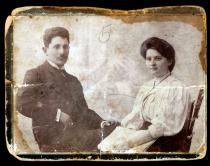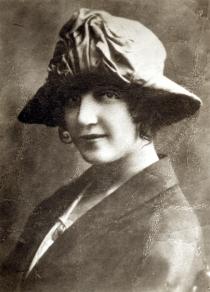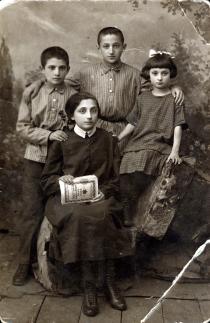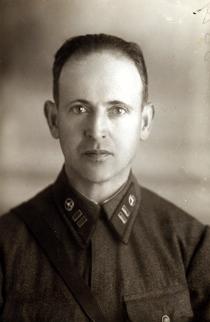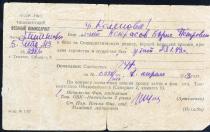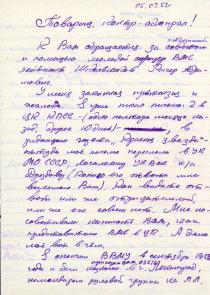Inna Shkolnikova
St. Petersburg
Russia
Interviewer: Inna Gimila
I was born to two university students in 1936 in Tashkent, Uzbekistan. My
father, Boris Nekrasov, was a graduate student and had been exempted from
army service. However, during the first few days of the war in 1941, he
left for the front voluntarily and was killed in the battles above Rostov
na Donu on January 23, 1943. I was 6 years old. My mother and I were
standing over the oven; Mother wore a white wool shawl over her shoulders.
Mother stroked my hair and said, "Now we've been orphaned." The room was
terribly quiet; all was like stone. At that moment I still hadn't realized
the full horror of what had happened. I cried bitterly after a few days
when some boy hurt my feelings; I thought, if Father was still living, he
wouldn't have let that happen.
My mother, Lyubov Danilovna, a 24-year-old widow, was left with not only a
6-year-old on her hands, but also with her paralyzed father, Danil
Aaronovich, and her mother, Eva (Hava) Leibovna. Mother was at this time,
even at such a young age, the director of the Tashkent evening school. The
students were injured soldiers who had been evacuated far from the front
lines to a place where the climate was good and there was fruit. In
Tashkent, the rehabilitation of soldiers was quick, as was their return to
the front.
Grandmother Hava at that time was 58. She was very talkative and kind, just
like my mother. She fed all the students who came to study at our
apartment, and saved all the neighbors by lending them money, even when she
had little for herself. My mother was the same. Uncle Aaron and Aunt Sara,
mother's older brother and sister, were serious, interested only in
scientific research. Even though Grandmother only finished two classes of
Hebrew school, she read as lot and had a wonderful memory, saving me
several times when I couldn't finish assigned readings on time. She
imparted her love of books and knowledge to her children: Aaron and my
mother attended a literary society that was run by Yaroslav Smelyakov, a
famous Russian poet. After the war the society was held at the House of
Scholars. The library that my parents collected contained more than 2,000
books. My husband and I collect books on art. Before the war, Grandmother
Hava and the children would take vacation to Cherikov. She was even in the
Crimea in 1916.
We dressed modestly in a European style. Grandmother mostly wore a dress
with a white collar when she went out. For everyday wear, she wore a skirt
and a sweater. Since Grandfather's brothers moved to America in 1920 and
sent help from there, Grandmother bought a hem-stitching machine at the
Torgsin store and decorated all her shirts, tablecloths, napkins and
pillowcases. No one was allowed to come close to the machine, even thought
the desire to "spin" the machine was great.
In our house, there often were puppet shows for children. I think this was
the Purimspiel tradition. Even though we have no grandchildren, we hold
celebrations for our neighbors' children to this day.
Our house always had fresh bouquets. The windows began to fill up when
Mother retired. Father worked in the Botanical Gardens in Tashkent from
1938 to 1941 and had his own plot there where he grew apple trees. Father
always brought flowers home. Once he brought home a basin of roses. Mother
was given flowers by her students. We gave them to each other on holidays,
buying them in stores and from street vendors.
The only decorations in our house were a marble table with a samovar on it,
a mirror in a big frame, and a buffet. The table was always covered with a
flaxen tablecloth embroidered with blue flowers. Uncle Aaron was a
geologist and roamed from expedition to expedition. He had temporary
lodgings. Aunt Sarah, Mother's older sister, was a doctor and had her own
four-room house in Tashkent. It also had an office for her husband, a big
porch, running water, a toilet in the yard and a garden. There was Nanny
Dusya - the children called her Marusya - who did housework, and her father
who was the gardener. Her father, a German, had sold all his belongings to
purchase a machine that printed money, but it only printed 10 bills and
then broke. Dusya was a Russian woman of about 30, who studied in the
evenings to be a nurse, fed the children and walked with them because Aunt
Sarah's younger daughter, Natasha, was diagnosed with cerebral palsy and
needed specialized care. At that time there were no wheelchairs or braces.
I don't know why, maybe because our family was surrounded by Russians and
Uzbeks, but in our house Yiddish was only spoken when the adults wanted to
hide something from the children. In those situations, I would say,
"Enough, speak properly!" and all the adults would laugh. I also remember
one song: "Der shneider shnei mid shnei." Candles and kerosene lamps were
lit so often that I don't remember any special candle-lighting. To be
honest, we would stick needles in the meter, connect the wires and "steal"
electricity, which was rationed.
Before the war, in Tashkent, the milk was brought by a milkman. He would
make a mark on the white wall of each house with a stick of charcoal and
when the stick ran out everyone paid their debt and the wall was
whitewashed. If he brought fruit, it was weighed on hand scales, with a
stone as a weight; but the measurement was as exact as in a pharmacy. We
bought foodstuffs at the Alaiskii bazaar, the biggest market in Tashkent.
During the war, we bought things with ration cards. I would stand in line
and then an adult would come to take my place and buy things, until 1946
when I was trusted to carry the cards. There was a careful science to
rationing. One had to be able to pick the best of each assortment of wares
because on one card one could buy either a half-kilo of smelt or a liter of
sunflower oil. You had to decide quickly which was better because food
wasn't always available in the stores. Lines - it feels like half my life
was spent in them. But the biggest lines were at the banya. It was freezing
in the street, then you got into the building and washed. In the building,
it was very hot, but you weren't allowed back out. Children whined. Linens
were taken to the "lice battler," and they gave you dry, warm and stinky
clothes in return. They smelled like goats, very unpleasantly. There were
some tragicomic situation: At the beginning of the war, Grandfather went to
the banya in a fox-fur coat and came back in the quilted robe of a
bathhouse attendant and someone's pants, which were too short.
My father-in-law, Abram Shkolnikov, told me that in his family meat was
eaten once a week, on Saturdays. During the war, there was no meat. We ate
little, Grandmother Hava often was in the hospital with little cousin
Natasha, and I would travel across the city to visit them and eat at the
hospital. I remember how I wanted to know what fried eggs tasted like, but
Grandmother explained that without butter they wouldn't be good. I was
stubborn, but Grandmother was right. Those eggs weren't tasty at all! After
the war, no holiday was complete without stuffed pike or herring butter,
and the teiglach and tzimmes would just melt in your mouth!
Women braided their hair and did it up in a net, while girls wrapped their
braids around their heads. All had long hair, down past their waists.
Family legend says that during the 1920s, Grandma was courted by Buden and
he gave her ribbons for her braids. This was somewhere near Ekaterinodar. I
had poor hair; as a child I would wrap a sheet around my head and pretend
it was a braid. I remember during an outbreak of typhus in Tashkent,
Grandma Hava was shorn of all her hair. And I, silly little girl, not
thinking that I would hurt her, said, "I asked you for your braid and you
said 'no.' You would have done better to have given it to me!" I was very
afraid that her hair wouldn't grow back, but she grew the braid again, and
now I have it in my closet.
Grandmother was buried in the European fashion, in a coffin in the Jewish
cemetery. They said Kaddish and the cantor sang beautifully. After Kaddish,
Mother and I had pieces of our shirts ripped off and buried.
Aunt Sarah, the professor's wife, always had outfits sewn by the best
tailors, but Mother could only afford this in the 1950s. Her students later
told me that they couldn't wait to come to my mother's class so that they
could see what she was wearing. As a matter of fact, my mother always said
a teacher shouldn't dress like a "blue stocking," but more civilized, which
pleased the children. Uncle Aaron saw nothing but his scientific work.
People laughed at him when he said satin was a kind of wool. His wife took
care of his clothing. Tailors in Tashkent were afraid of the inspectors
from the tax police and went to people's houses to sew. They were fed and
paid, not for each item of clothing, but for each day's work.
In Sarah's house there was a piano and in the evenings there was music,
especially when her neighbors were refugees - students from the
conservatory in Leningrad, including the family of the composer
Kotlyarevskovo. Her children also studied music. Even with such a posh
lifestyle for those days, Sarah, at the first call, night or day, would go
heal the sick. Grandmother loved Sarah selflessly and I really wanted to
become a doctor like Sarah.
During the war, in 1942, refugees came to us from Kharkov: Grandmother's
brother Josef with his wife, Frieda, as well as two of Grandmother's
sisters and their families and my deaf-mute great-grandmother. These 14
people fit somehow into a two-room apartment. I don't remember my great-
grandmother's name; at home we simply called her "Old Grandmother." The
grownups slept in pairs on skinny metal beds. The older boys and girls
slept on the table and dresser, and the little children on chairs pulled
together. I remember how I would run to Great-Grandmother, tug at her long,
gray, canvas skirt and, with gestures, show her that it wouldn't hurt the
bread any to be spread with pate or something else. The fact that my great-
grandmother was a deaf-mute wasn't discovered by my great-grandfather Leib
Bernstein, a Talmudist from Chernikov, Ukraine, until the day of their
wedding. Before the ceremony he had only seen his bride from far away. In
spite of this they had 12 children, five of whom lived until the war:
Hannah; Hava; Dina, a doctor; Josef, a member of a collective; and Lazar, a
jeweler. All their children were able to speak. I remember that we buried
Great-Grandmother wrapped in a shroud - as I later learned, in the Jewish
tradition. I was strolling somewhere, and when I returned home, strangers
were carrying out something thickly wrapped, shrouded, in white sheets.
Mother said that all the elders were going to bury Old Grandmother. Later,
seeing people interred in coffins, I learned that in the Jewish tradition
people were buried wrapped in material.
I truly loved kindergarten. However, during the war Mother didn't have the
money to regularly pay for it. One day they wouldn't let me in. It was
raining, Mother was crying and asking them to wait until money came in.
During the war, the officers received the money that was to be sent to
families. I didn't know about that, but I talked Mother into taking me to
school that very day because she worked there. I was only 6. This crusade
ended with my getting into a car accident - a drunken driver hit me while I
was standing on the sidewalk; he was later convicted. I was saved by the
surgeons at the hospital where Aunt Sarah was the head doctor. After the
operation I was nursed by Mother's cousin Lyuba, Grandma's sister Hannah's
daughter, and her schoolmate, Izya.
Grandmother taught me how to knit, and Mother, how to sew. During the war,
I would hide a piece of bread in my pants and trade it for embroidery
thread at a kiosk near our house from a lady from Odessa.
I was brought up by my stepfather, Mikhail Rafilovich Rubanenko - a person
of high moral qualities and intellect. He gave me not only an education,
but also sheltered my family when, in 1961, my husband was demobilized from
the Soviet Army. He gave us his 30-square-meter room, and he and Mother
slept behind a curtain in 6 square meters. Suffocating in that space, he
spent half the night in the kitchen reading books. I began to call him
Father upon the birth of my little sister Natasha, August 19, 1947, and
called him such until his death on August 16, 1991.
The school in Tashkent was a one-story building that was heated by stoves;
water stood in barrels with a cup fastened to its handle; and the toilet
was outside. Girls and boys studied separately. In the winter we went to
school in warm gowns and in the spring in summer dresses. I began wearing a
uniform consisting of a brown dress and an apron in 1948. Along with
Russian I also studied the Uzbek language. I remember how they taught us
the anthem of the USSR. We were all taken into the corridor and we shouted
out the text.
I went to school from 1942 to 1943 in thick wool socks and galoshes. In
1943, as the daughter of a killed soldier, I was given sandals that were
then taken from me by my brother Vitalik, who then gave me his old ones. In
the winter I was given boots, black ones with laces, and the adults made
sure that I didn't lose them this time. My greatest happiness was Mother's
old leather briefcase with shiny little locks. We wrote with fountain pens
and inkstands. The ink was poured into the inkstands from an unspillable
ink jar, brought into the school in a tobacco pouch and placed in the cut-
out of the desk. When the ink ran low, we added water. My pouch and socks,
which I knitted under Grandma's supervision, were sent with some other
things to the front to Father Misha - that was what I called Mikhail
Rafilovich. The factory at which Father Misha worked made projectors for
the operating lamps at hospitals, and Aunt Sarah often asked this factory
for help. That is where she met Roman Alexandrovich Gavrilov, who saved us
in 1953. She invited him to her house. This was May 30, 1943, and my
parents always celebrated that date thereafter. Gavrilov came to her house
with Father Misha; my mother also came. That is how they met.
In 1944, Mikhail Rafilovich, having left the army, was shell-shocked and in
a hospital in Yugoslavia where he was found by Aunt Sarah, taken back to
her hospital and cured. Father was a closed person, stern but very kind. In
1945 we left Tashkent for Moscow where we lived in Cherkizov in the house
of one of Father's distant relatives, the artist Ilya Lisitskovo. By the
way, when foreigners, in 1947, were interested in the avant-garde works of
Ilya, his brother Rubim went to the KGB and asked for permission to sell
the works. The comrades from the KGB came and took everything except some
toys and a few photos.
Half of the house in Cherkizov, Moscow, was sold by the owner to a
religious Jew named Solomon. He attended the prayer house in Cherkizov. I
wanted to go there and look in, but Mother explained that women and girls
didn't go there. I still went and peeked in, and saw that old men in black
clothing were sitting at a long table. On the walls there were no paintings
or icons. Where did I find out about icons? I was in a church, seeing as I
was a typical curious child and stuck my nose in everything.
The daughter of Grandfather Solomon was married to a Russian general from
Marshal Zhukov's division. In 1947, when they were dealing with Zhukov,
they came at night for my father while they searched Solomon's house. It
was summer and all the windows were open. The general's housekeeper,
Natasha, threw a packet through the window that Mother hid under her
pillow. That morning Solomon came and brought Mother a large box of the
perfume "Red Moscow," but didn't eat with us and or even have tea because
our house was not kosher. After a few days, Solomon's granddaughter, Sveta,
in disgust over her cut finger said: "What is this! Soon Stalin will even
take our skins from us." And this turned out to be true. They were sent to
Kazakhstan and Solomon and his wife died from grief. Not far off was the
famous "Doctor's affair" of 1953.
At that time we already lived in Leningrad, Father was the head builder at
the factory Svetlana when a "blacklist" was written against all the Jewish
workers. The situation was saved by Roman Alexandrovich Gavrilov - with his
own life. Going up alone against the party, local committee and other
organizations gave him a heart attack. This story was told to us by Yakov
Slavin, the head army representative of the factory, at my father's
funeral. He kept this secret for 37 years. That is how strong fear was
during Stalinist times. In 1953, my mother-in-law, a teacher of Yiddish
before the war in Belarus, not only burned all of her Jewish books, but
also her work records.
Father Misha had a daughter, Ludmilla, from his first marriage to Eva
Nevezhska, an X-ray technician. Eva died of radiation at the beginning of
the war. Ludmilla and my mother had a very warm relationship. Ludmilla -
the most sensible of us three sisters - is very well read. She lives with
her children and grandchildren in America.
In 1953 my future husband, Grigorii Abramovich Shkolnikov, an officer who
finished among the best at the Pacific Ocean Naval Academy and obtained a
post on a submarine in the north, was removed from his post because of his
Jewish background. He was 25. He fought for justice because of his honest
soul and his belief in the Communist Party, writing a letter to the Central
Committee of the Communist Party of the Soviet Union. Only the execution of
Beria allowed him to escape an investigation. The same committee that
forced him to leave the submarine offered him a position on a minesweeping
trawler, where he quickly became the navigator of the flagship and spent
468 days in the minefield of the Baltic Sea, clearing mines. He received a
medal for this 40 years later "for battling mines." In answer to his
complaint, a commission from Moscow arrived - a representative of the Navy,
Captain Ogurtsov. My husband was read the order for his assignment to the
minesweeper in the office of the assistant of the head of the naval bases,
Vanifatev. Before this, he was forced to sail on the fire-fighting ship
around the Fontanka, which was insufferable for a real submariner.
We were married in 1955, when I was 19. I was a student at the Leningrad
Institute of Film Engineers; he was an officer. As the wife of a soldier,
finding work was difficult. With the help of my husband and his comrades, I
organized courses in film mechanics in a prison camp in the city of Liepaya
- this camp was famous for a riot - and, after my husband's demobilization,
we returned to Leningrad.
I'll tell about the incident in the camp in May, 1959. The head of the club
in which my husband served obtained an agreement with the head of the camp
saying that I could teach the prisoners the profession of film mechanics.
He gave me a film projector for cinema showings of films, which he also
gave me, and I gave lessons by a set program twice a week for four hours.
The courses were first organized for the camp guards, six of them. However,
the administration of the camp had no money to pay my salary except if they
took on prisoners as students. These students would have 1 ruble per month
taken from their bank accounts for the lessons. There were 37 people, and
they paid 37 rubles. The first to come to the lessons were the convicts. I
left the class to ask the guards to come in so that I could finish the
class. When I came back into class, I saw that the tables had been moved
and the chairs had been set on them. Through this barricade I could see 37
pairs of angry eyes - prisoners who didn't want to study with the guards. I
was very scared; I had a baby at home. I calmed them down by finding a
clever way out of this situation: I said: "Do you know that I'm a member of
the Komsomol? I have to submit instructions to the secretary of the
Komsomol organization in this camp?" They gave up and in the end, we had
class with both the guards and the prisoners together.
I worked as an engineer, and Grisha, after his successful service in the
Navy, wasn't hired in the Baltic factory because of the Fifth Article and
worked in the construction bureau of the Svetlana factory. In 1987 he was
accused of being a Zionist -at that time in the group there were five Jews
and one was planning to leave for Israel, and Grisha was forced to leave
Svetlana. And we, battle-hardened by our fights with anti-Semites, began
life from nothing. Grisha began to study economy, obtained a diploma and
was employed immediately.
Father was buried on the day of the putsch in 1991, and even though he gave
51 years of his life to the factory, they wouldn't allow farewells to be
said near the factory. Many people came to the burial anyhow.
My daughter, Irina, graduated from the Leningrad Institute of Engineering
and Building, and was an architect on more than 50 buildings in Russia. Her
projects have been published in the magazine "Private Architecture." Her
husband, Gennadii Aaronovich Bekker, to enter the military academy, was
forced to change his name to Gennadii Alexandrovich Bekerov, but he didn't
want to change his nationality and the Fifth Article didn't allow him to
enter the academy. Gennadii graduated from the Textile Institute and was
recently re-elected as the representative of the municipal council of the
village of Tyarlevo.
Anti-Semitism was so widespread in Russia after the war that it spread our
family all over the world. My younger sister lives with her family in
America, my husband's sister lives in Israel, my uncle, once removed, lives
in Australia.
Our young Russian neighbor, who moved to the city from the country, said to
me: "I've been told that you're Jewish, but I didn't believe it, because
you work so hard." I answered, "Kolya, in the country, where you lived, did
you see even one Jew?" He said, "No." Do you have any questions? I don't.
It was fed to him with his mother's milk.
